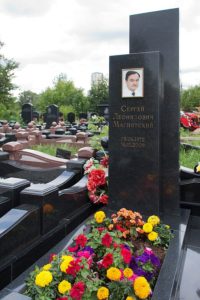Previous post
Next post

How many of our readers remember Sergei Magnitsky? The Russian lawyer exposed corruption on a grand scale in Russia, and his death has drawn international attention to human rights abuses that led to Congress passing the Magnitsky Act in 2012 and the Global Magnitsky Act (GLOMAG) four years later, allowing the President to impose visa bans and targeted sanctions on individuals anywhere in the world responsible for committing human rights abuses or acts of significant corruption.
As a bit of background, Magnitsky worked as an auditor who exposed governmental misconduct and corruption in Russia.
On October 7th 2008, Sergei Magnitsky testified against Russian Interior Ministry officers for their role in the theft of his client (Hermitage Fund)’s investment companies and in the theft of $230 million of funds paid by these Hermitage companies in taxes (see 7 October 2008 testimony in Russian here). The officials and criminals involved in the corrupt scheme were so brazen that they stole the entire amount of capital gains taxes that had been paid by 3 Hermitage Fund companies to the Russian government and arrested the man who testified about their crime.
Magnitsky died in Butyrka, where he was tortured and denied medical treatment for nearly a year. A human rights panel provided hundreds of pages of documents on the torture and death of Sergei Magnitsky that showed he had been physically assaulted before his death. The Russians, for their part, claimed they investigated, but found no malpractice occurred and then tried Magnitsky posthumously for alleged “tax evasion.”
The resulting international attention led to the Magnitsky Act and subsequently GLOMAG, which affected a number of Russians, including the judge who extended Magnitsky’s detention, leading to his death, several Moscow tax officials, and investigators in the case.
GLOMAG targeted non-Russians for corruption and violation of human rights, including Chechen leader Ramzan Kadyrov, Saudi individuals involved in the death of Jamal Khashoggi, and officials involved in the abuses against the Rohingya in Burma.

Magnitsky’s tragic demise helped international efforts to expose and punish corrupt human rights abusers all over the world, but the Russians continued to deny that they did anything wrong, but did manage to throw a few low-level officials under the bus in an effort to appear that they were doing their due diligence in holding those involved in Magnitsky’s death accountable, and Magnitsky’s family got no closure.
Until today.
Today, however, the European Human Rights Court smacked Russia for multiple violations of human rights in the Magnitsky affair.
A non-profit human rights NGO, Physicians for Human Rights determined that the treatment of Magnitsky during his detention was ““calculated, deliberate and inhumane,” according to court documents. The court agreed that Magnitsky was mistreated by his guards and received inadequate medical care while in detention. The court also agreed that the investigation into Magnitsky’s death by Russian authorities was lacking, and even though the court held that there was sufficient evidence to suspect that Magnitsky was involved tax evasion, said suspicion was not grounds to keep him detained for nearly a year and torture him to death.
The family will receive roughly $38,000 in Euros for the death of their loved one, but the attention drawn to Russia, its corruption, and the inhumane treatment of its citizens is priceless.
Whether Magnitsky was involved in tax evasion or not, we may never know. The court claims Moscow had grounds to accuse the lawyer, but the posthumous trial and subsequent conviction was anything but just and objective, given that the accused never had the opportunity to defend himself. The trial further drew attention to the malignant corruptocrats who are running Russia right now.
The European Court’s decision today confirms that the evil cancer inside Russia is thriving, and vindicates the claims of Magnitsky’s family that Russia callously murdered Sergei Magnitsky to cover up the government’s theft of hundreds of millions of dollars.
Russian officials should continue to be held accountable for their corruption and murder. The Magnitsky Act was the right thing to do, and these swine should never be allowed to step foot on our soil nor use our financial system to enrich themselves at the people’s expense.
Bravo, European Court for Human Rights! You done good.
Featured image: European Court for Human Rights;
Leave a Reply